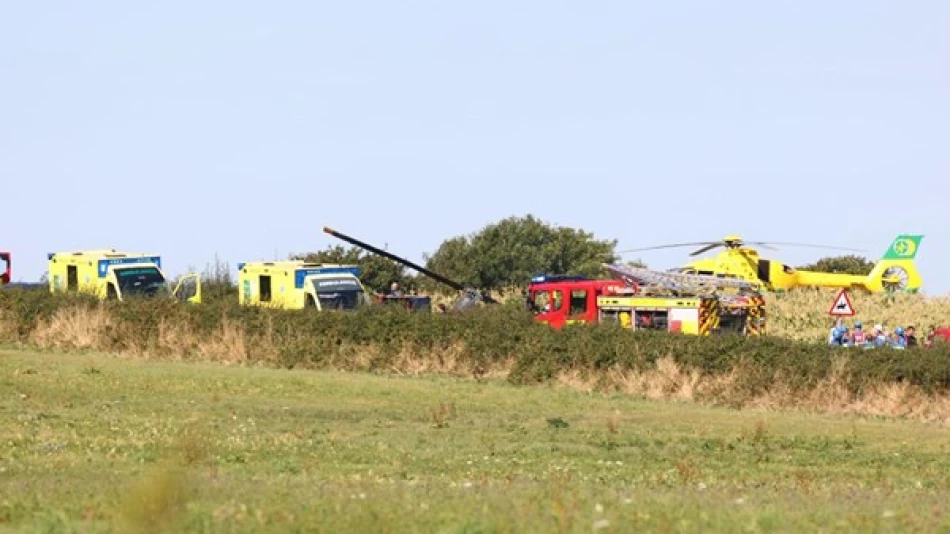
Plane Crashes During Training on British Island: Tragedy Unfolds in Aviation Incident
Training Flight Turns Deadly: Helicopter Crash on Isle of Wight Exposes Aviation Safety Concerns
A routine training exercise became a life-threatening emergency when a helicopter carrying four people crashed near a resort on the Isle of Wight, highlighting ongoing safety challenges in the UK's aviation training sector. One person required emergency airlift to a specialized trauma center, underscoring the severity of the incident that has reignited discussions about training protocols for commercial helicopter operations.
The Incident: What We Know
British police confirmed that the aircraft, operated by Northumbria Helicopter and identified as model G-OCLV, went down in a field near the town of Ventnor during a training flight. Hampshire and Isle of Wight Police coordinated the emergency response, with one critically injured passenger requiring immediate helicopter transport to a trauma facility.
The crash occurred in close proximity to resort areas, raising questions about flight path regulations over populated tourist zones. The Isle of Wight, a popular destination for both domestic and international visitors, regularly sees helicopter traffic for both commercial and training purposes.
Training Flight Risks: An Industry Under Scrutiny
This incident adds to a concerning pattern of training-related aviation accidents across the UK. Training flights, while essential for pilot certification and skill maintenance, statistically present higher risk profiles than routine commercial operations due to the nature of practice maneuvers and less experienced pilots at the controls.
Regulatory Framework Challenges
The UK's Civil Aviation Authority has been working to strengthen training protocols following several high-profile incidents in recent years. Unlike fixed-wing aircraft training, helicopter instruction often involves more complex low-altitude maneuvers and emergency simulations that can quickly turn dangerous if equipment fails or weather conditions deteriorate.
Economic Impact on Regional Aviation
The helicopter training industry represents a significant economic sector for the UK, particularly in coastal regions where weather conditions and airspace availability make training more feasible. Companies like Northumbria Helicopter serve dual roles as commercial operators and training providers, making safety incidents particularly damaging to both operational capacity and reputation.
Insurance implications from such crashes often ripple through the entire sector, potentially increasing costs for all operators and ultimately affecting the availability of pilot training programs across the region.
Comparative Safety Standards
The UK's helicopter safety record, while generally strong compared to developing aviation markets, lags behind countries like Norway and Australia, which have implemented more stringent simulator requirements before live aircraft training. The European Union's aviation safety agency has been pushing for harmonized training standards, but implementation remains inconsistent across member states and post-Brexit UK operations.
Technology Solutions on the Horizon
Advanced flight simulation technology and enhanced terrain awareness systems could significantly reduce training-related incidents. However, the high cost of upgrading training fleets means many operators, particularly smaller companies, continue relying on older aircraft and traditional training methods that may not incorporate the latest safety innovations.
This crash will likely accelerate regulatory discussions about mandatory safety equipment upgrades and revised training protocols, potentially reshaping how the UK's helicopter industry approaches pilot education and certification in an increasingly safety-conscious aviation environment.
Most Viewed News

 Layla Al Mansoori
Layla Al Mansoori






